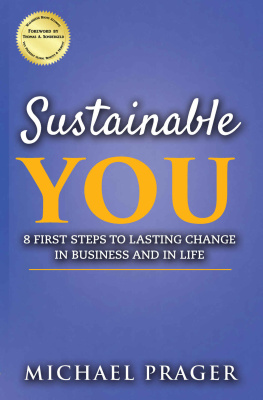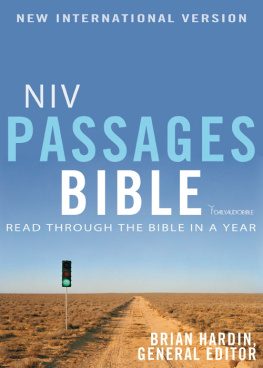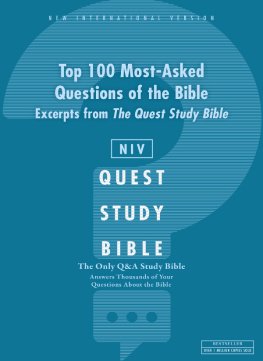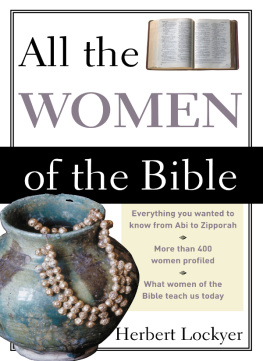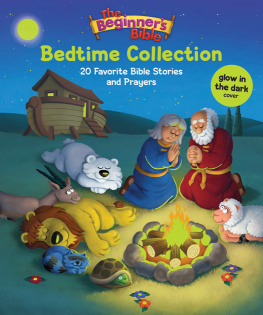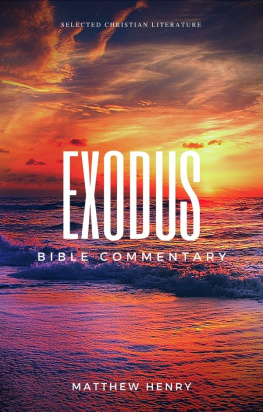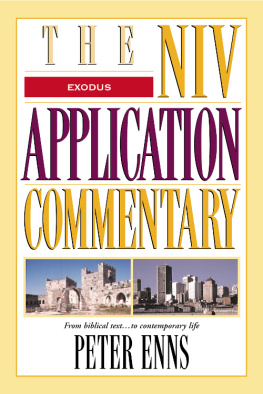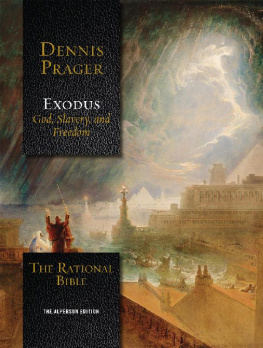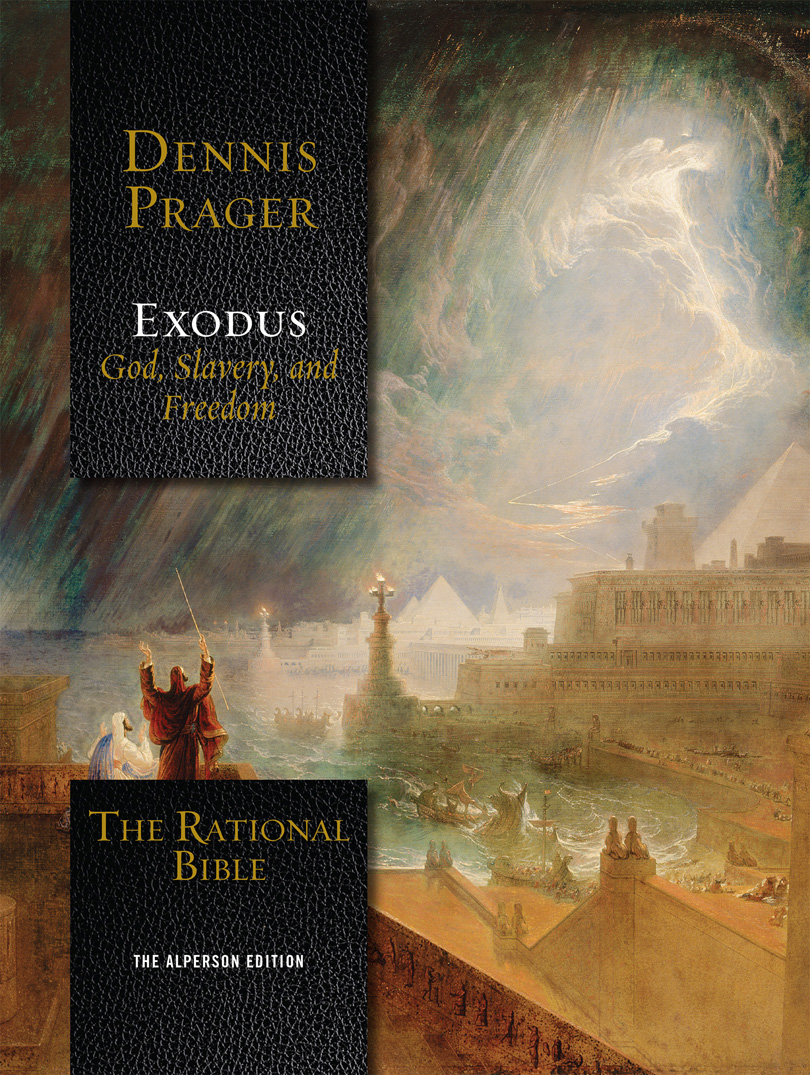

Copyright 2018 by Dennis Prager
All rights reserved. No part of this publication may be reproduced or transmitted in any form or by any means electronic or mechanical, including photocopy, recording, or any information storage and retrieval system now known or to be invented, without permission in writing from the publisher, except by a reviewer who wishes to quote brief passages in connection with a review written for inclusion in a magazine, newspaper, website, or broadcast.
Regnery Faith is a trademark of Salem Communications Holding Corporation
Regnery is a registered trademark of Salem Communications Holding Corporation
All Scripture taken from New JPS Translation, Jewish Publication Society. Philadelphia, PA 1985. Used by permission.
Cataloging-in-Publication data on file with the Library of Congress
ISBN 978-1-62157-799-7
Published in the United States by
Regnery Faith
An imprint of Regnery Publishing
A Division of Salem Media Group
300 New Jersey Ave NW
Washington, DC 20001
www.RegneryFaith.com
10 9 8 7 6 5 4 3 2 1
Books are available in quantity for promotional or premium use.
For information on discounts and terms, please visit our website: www.Regnery.com.
CONTENTS
Table of Contents
Guide
To Sue
It is not good for man to be alone.
I will make him a helper who is his equal.
Genesis 2:18 (literal translation)
To the reader: Reading this Introduction will greatly enhance your understanding and enjoyment of this commentary.
MOST PEOPLEESPECIALLY IN THEIR YOUNGER YEARSPASS THROUGH A DIFFICULT time with one or both of their parents. In my teen years and twenties, I was one of them. But no matter how I felt, there was never a time I did not honor my parents. For example, from the age of twenty-one, when I left my parents home, I called my parents every week of their lives.
I treated my parents with such respect because I always believed God had commanded me to do so: Honor your father and mother (Commandment Five of the Ten Commandments). The Torahas the first five books of the Bible have always been known in Hebrewcommands us to love our neighbor, to love God, and to love the stranger; but we are never commanded to love our parents. We are commanded to honor them (and we are not commanded to honor anyone else).
Why do I begin this introduction to a Bible commentary with this personal story?
Because it encapsulates why I have devoted so much of my life to explaining the Torah: because its central messagethat God is good and demands we be goodis the only belief that will enable us to make a good world.
I have been teaching the Torah for much of my adult life and have devoted decades to writing this explanation of, and commentary on, the Torah.
I have done so because I believe if people properly understand the Torah and attempt to live by its values and precepts, the world will be an infinitely kinder and more just place.
All my life I have been preoccupiedalmost obsessedwith the problem of evil: people deliberately hurting other people. At the age of sixteen, I wrote in my diary that I wanted to devote my life to influencing people to the good. That mission has animated my life. In a nutshell, I love goodness and hate evil. My favorite verse in the Bible is Those of you who love Godhate evil (Psalms 97:10).
Because of my (and the Torahs) preoccupation with evil, in this commentary I frequently cite the two most recent examples of mass evilNazism and communism. I assume all readers of this commentary have some acquaintance with Nazi evil. Tragically, however, relatively few people have much knowledge of communist evil. So, I should note here that communist regimes murdered about 100 million people and enslaved and destroyed the lives of more than a billion. If you hate evil, you must confront what Nazis and communists wrought in the twentieth century (and what others wrought before them and are doing at this time).
I have had one other mission: to understand human beings. The two missionspromoting goodness and attaining wisdomare linked, because it is almost impossible to do good without wisdom. All the good intentions in the world are likely to be worthless without wisdom. Many of the horrors of the twentieth century were supported by people with good intentions who lacked wisdom.
Here, too, because it has so much wisdom, the Torah is indispensable.
However, we live in an age that not only has little wisdom, it doesnt even have many people who value it. People greatly value knowledge and intelligence, but not wisdom. And the lack of wisdomcertainly in America and the rest of the Westis directly related to the decline in biblical literacy. In the American past, virtually every home, no matter how poor, owned a Bible. It was the primary vehicle by which parents passed wisdom on to their children.
In the modern period, however, people have increasingly replaced Bible-based homes and Bible-based schools with godless homes and with schools in which the Bible is never referred to. As a result, we are less wise and more morally confused. As I show in my discussion of secular education as a potential false god, the best educated in the West have often both lacked wisdom and been among the greatest supporters of evil ideologies and regimes.
Given the supreme importance of goodness and the indispensability of wisdom to goodness, the Torah, the greatest repository of goodness and wisdom in human history, is the most important book ever written. It gave birth to the rest of the Bible, to Christianity, and to Western civilization. It gave us Love your neighbor as yourself, the Ten Commandments, a just and loving God, and every other bedrock of humane civilization.
I have written this book for people of every faith, and for people of no faith. Throughout my years teaching the Torah, I would tell my students, The Torah either has something to say to everyone or it has nothing to say to Jews. The idea that the Torah is only for Jews is as absurd as the idea that Shakespeare is only for the English or Beethoven is only for Germans.
That is why, over time, half the people taking my Torah classesat a Jewish university no lesswere not Jews.
Nevertheless, I would like to address some groups specifically.
Because the Torah has formed the basis of Jewish life for 3,000 years, there are very many Jewish commentaries, a good number of which have passed the hardest test: the test of time. However, the modern world poses intellectual and moral challenges that did not exist when the classic Jewish commentariesmost dating to the Middle Ageswere written. Therefore, most modern Jews read neither those commentaries nor the Torah. I hope this commentary will address nearly all the intellectual and moral objections of these Jews.
In general, it has not gone well for Jews (or the world) when Jews ceased believing in the Torah. Belief in the Torah as a divine document has probably been the single most important reason Jews have stayed alive for 3,000 years and it has formed the core of Jews moral values. When Jews abandoned belief in the Torah, they or their offspring almost always ceased being Jews; and, too often, they created or joined social movements with non-Torah, or even anti-Torah, values.



